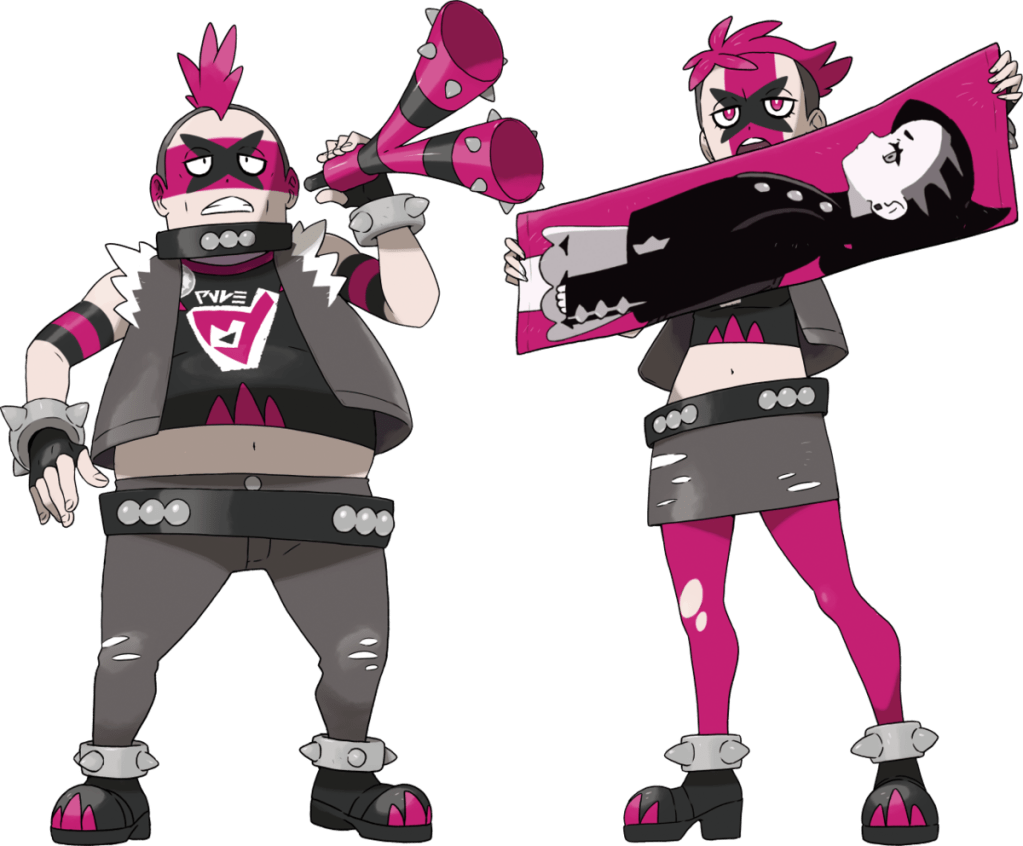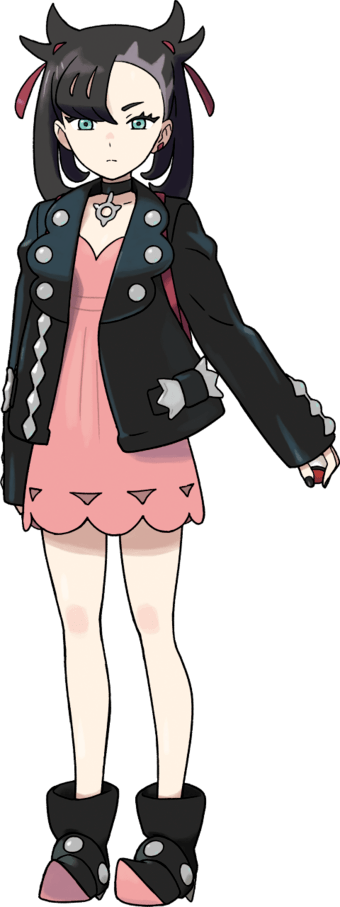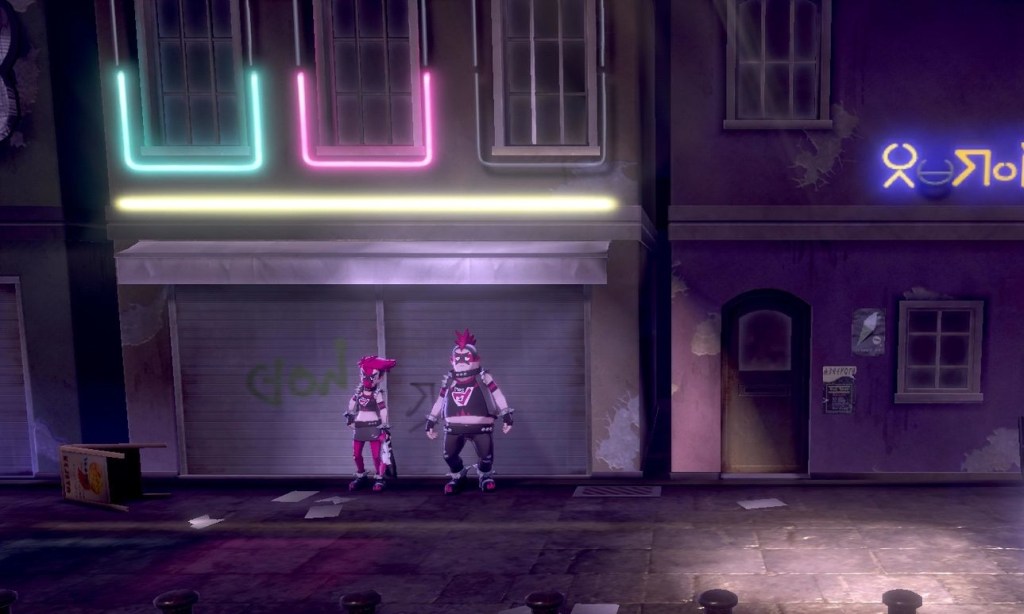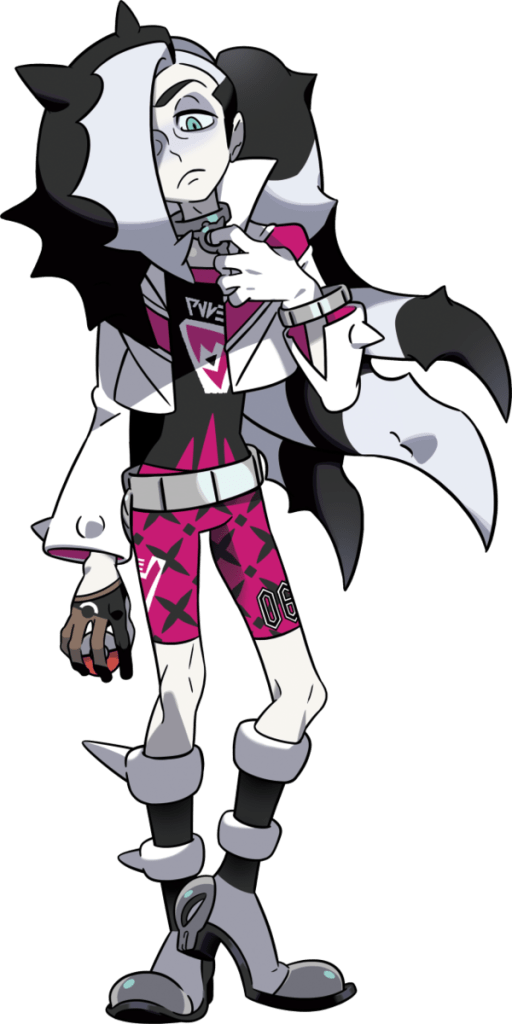Okay; let’s get cracking! New generation, renewed sense of purpose, momentary spike in my will to live… aaaaaand it’s gone.
Oh well.
I’m going to begin with my character studies of the major players in the plot of Sword and Shield, rather than Pokémon reviews like I’ve done in the past, partly because I want to get my thoughts on the story out there while the games are fresh in people’s minds and it’s more immediately relevant… and partly because I was still doing Pokémon reviews for generation VII just a couple of months ago and frankly I need a minute (also I am kiiiiinda thinking I should go back and do the characters from Sun and Moon that I missed out). Let’s start with the, uh… pseudo-villains… of Sword and Shield – Team Yell – and their reluctant “leaders” Piers and Marnie. In more ways than one, Team Yell are a continuation of things we saw in Sun and Moon with Team Skull. Team Skull are arguably not “villains” in Sun and Moon, and certainly not the main antagonists. They’re set up as troublemakers and petty criminals, but if anything we’re supposed to come to sympathise with them by the end of the game, and their leaders earn redemption in the epilogue. Team Yell are the same, but more so: they’re obstructive and annoying, but they never really hurt anyone as far as we see, and once we learn their true nature, it’s clear that their motives are – if not exactly “pure” – certainly understandable.

The first half of the game establishes Team Yell as a bunch of obnoxious jerks who spend their time harassing the citizens of Galar, especially trainers undertaking the gym challenge. Everything about them is loud – their name, their pink-and-black face paint and punk fashion sense, their rowdy cheers, even their weird double-headed vuvuzelas. They’re kind of a blending of English football hooligans (in keeping with Galar’s football-inspired stadiums, trainer uniforms and cheering crowds) with punk aesthetics. We learn in our very first interaction with them that they’re fans of Marnie, one of the other young trainers starting the Gym Challenge at the same time as the player, and have a weird relationship with her. Marnie doesn’t like her fans bothering people, and will tell them off if she sees them, but that doesn’t stop them from making a nuisance of themselves whenever she’s not around. They talk about wanting to “help” Marnie win the Gym Challenge, and although they ostensibly plan to do that by cheering for her, their dialogue implies that they’re willing to go much farther, even to obstruct and sabotage other trainers. As we progress in the Gym Challenge and explore different areas of the Galar region, Team Yell members regularly provide the “roadblocks” that prevent us from getting into places we aren’t “supposed” to go until later in the story – occupying the eastward road out of Hammerlocke when the plot calls for us to head west to Stow-on-Side, for instance. It’s that old inelegant RPG trope of the “broken bridge” that will stay broken until you’ve done something unrelated to advance the story, which Pokémon has been guilty of deploying in every game. It sort of makes sense here, though, since Team Yell’s whole raison d’être is to create arbitrary and mean-spirited obstacles for Marnie’s rivals.
There are also a few occasions when we actually interact with them: they occupy the lobby of the Budew Drop Inn in Motostoke to prevent other trainers from checking in; they attempt to steal (or “borrow,” they claim) a bicycle from an old man, so they can use it to chase other challengers and wear them out; they try to keep us from leaving Hammerlocke so that we won’t disturb a sleeping Silicobra; and, finally, they stop us from using a wild Drednaw to ride across Circhester Bay, apparently blissfully unaware that there is a bike upgrade that will let us cross water unaided. Not a genius group, or a particularly dangerous one, although there is a certain earnestness in their efforts to protect the wild Pokémon in those last two encounters.

Then there’s Marnie. Marnie herself is very down-to-earth, stoic and reserved – the polar opposite of her loud, pushy supporters – and views their fanaticism with a sort of affectionate embarrassment. She’s absolutely serious about winning the gym challenge and becoming Champion, but she has no intention of sabotaging her rivals to get there; she fully intends to achieve victory through her own merit as a Pokémon trainer. Marnie herself is a little tight-lipped about her motives, but the text of her Pokémon League trading card – which we receive after first battling her, just before challenging the Motostoke Gym – explains that she hopes to “breathe life back into her dilapidated hometown” (it also provides an early hint that her older brother is going to be an important character; according to the card, he gave Marnie her partner Pokémon, Morpeko). The dilapidated hometown – Spikemuth – is a bit reminiscent of Po Town, the town taken over by Team Skull in Sun and Moon. It’s gated off from the outside world and pretty run-down – lots of closed-up shops, dimly lit streets, graffiti, broken windows, rubbish, clutter, grime – and, of course, when we get there in the second half of the game, it’s occupied almost entirely by members of Team Yell, who have locked down the city and do their level best to keep us from getting to the gym. When Marnie’s card talks about her desire to bring her hometown back to life, it’s easy to see what it means. Moreover, it’s not hard to imagine how she could do that. A Spikemuth-born Champion would bring the town a lot of good publicity, and the Champion’s hometown would no doubt host a lot of popular events like exhibition matches. As Champion, Marnie would also be in a position to endorse promising young trainers from Spikemuth to compete in Pokémon League events (this is an important way in which Galar is different from other regions we’ve seen: trainers need a letter of endorsement from a League official to take the Gym Challenge, and it seems like endorsements from higher-ranking figures, like the Champion or Chairman, are very prestigious). Marnie makes it clear in her final match against the player that she’s no demure, self-effacing heroine who thinks only of her duty; she wants the Championship for herself. However, the fate of her hometown is never far from her mind either.

When we first visit Spikemuth ourselves, it is revealed that Team Yell is made up entirely of gym trainers from the Spikemuth Gym. They have been barring other trainers from entering Spikemuth or challenging their leader, Piers – Marnie’s older brother – specifically to delay the progress of everyone else involved in the Gym Challenge and ensure that Marnie will ultimately emerge as the victor. Marnie continues to have no patience for any of this; she escorts the player into Spikemuth through a hidden back alley, and gives Team Yell’s ringleaders a stern chewing-out when she learns why they’ve been cheering for her all this time. Although she doesn’t approve of their methods, though, it seems like Team Yell’s goals may not be all that different from Marnie’s own: they too mention Spikemuth’s decline, and don’t seem to be confident that Piers can lead them out of it. They don’t explicitly say how Marnie becoming the Champion would fix any of that, but I think they probably have the same rationale in mind. Ironically, I suspect it’s Marnie’s own ambition that makes her so averse to letting Team Yell “help” her become Champion. If she were just in it to help Spikemuth, she might be willing to let them lean on the scales for her – but she’s a true Pokémon trainer. Training and battling are important to her, and she wants to become the Champion because she earned it.

Piers himself doesn’t know what his trainers have been doing. He noticed that he wasn’t getting challengers, obviously, but he seems to have put that down to his own failings as a gym leader – he thought trainers just weren’t interested in battling him. Piers seems to struggle a lot with feelings of inadequacy. His dialogue when we challenge him, as well as the text of his league card and other bits of dialogue from elsewhere in the game, make a fairly big deal of the fact that Spikemuth has no Power Spot – the mysterious nexuses of energy that allow Pokémon to Dynamax. This means, in turn, that Spikemuth has no stadium and cannot host the high-spectacle battles between gigantic Pokémon that the rest of Galar has come to expect. As a result, Spikemuth Gym can’t pull the crowds that the big stadiums can, and the town’s economy has suffered in the years since Dynamaxing became the big gimmick of Galar’s Pokémon League. Clearly none of this is Piers’ fault, and some of it seems to predate his tenure as Spikemuth’s gym leader, but he nonetheless blames himself for not drawing crowds and keeping Spikemuth on the map. Perhaps it’s because he’s also a performer – specifically a punk rock musician – that he considers this a personal failing; with the main gates of Spikemuth closed, he hasn’t been getting large audiences for his concerts either. Based on the text of the rare version of his league card, it seems like he’d been planning for his entire tenure as leader to eventually hand the Spikemuth Gym over to Marnie. Marnie herself has higher ambitions and flatly refuses when Piers offers her the position directly, during our visit to Spikemuth. She can’t be a gym leader if she’s the Champion of Galar, after all, and she actually does believe that her brother is a good gym leader, even if he doesn’t – she learned everything from him, after all. Eventually, though, she agrees to take over the Spikemuth Gym after the player becomes Champion. Piers remains pretty mopey when he’s not performing, but is a useful ally during the epilogue and seems to have a genuine sense of duty to the Galar region.

It’s clear that Piers has an odd, possibly strained relationship with Chairman Rose and the other Galar gym leaders. He’s the only leader who doesn’t attend the opening ceremony of the gym challenge (even Opal shows up, and she’s about 200 years old and actively trying to retire), prompting Chairman Rose to mention tersely that they’re one short, but not to explain who is missing or why. Piers might have chosen to boycott the ceremony to protest the neglect Spikemuth has suffered, or Team Yell might have somehow convinced him not to attend (or even intercepted his invitation) as part of their plan to keep anyone other than Marnie from obtaining his badge. Part of the general backstory of Galar is that it has “major” and “minor” league gym leaders, which is why we meet Allister and Melony on Shield, but Bea and Gordie on Sword – different leaders make it into the major league on the two different versions. I’d conjecture that Piers, for whatever reason, was convinced that he’d been relegated to the minor league (or soon would be), and that’s why he wasn’t surprised when his stream of challengers suddenly dried up. He also seems to regard Dynamaxing as something of a gimmick. He describes Spikemuth’s gym battles as more “authentic” for its absence, and he refuses to Dynamax his own Pokémon even while battling away from home in a large stadium like Wyndon’s (I’m not sure if he actually has a Dynamax Band, but they don’t appear to be all that rare in Galar). Even then, fighting with one hand tied behind his back, he defeats Kabu in the Championship Cup and manages to give Raihan, supposedly the strongest gym leader, a run for his money (Raihan later promises him a rematch, with no Dynamaxing on either side). Some of the animosity that Piers perceives here is probably in his imagination, based on his assumption that other important trainers are just as pessimistic about his abilities as he is – but I’m not sure that’s all of it.

If you return to Spikemuth after the end of the story and talk to the Team Yell trainers who live there, one of them mentions that Chairman Rose once tried to move the gym away from Spikemuth to place it near a Power Spot, where it would be possible to construct a Dynamax-friendly stadium (remember here that the entire stadium network, along with the Dynamax-focused Gym Challenge that goes with it, is Rose’s brainchild, set up using data he gathered years ago with Professor Magnolia’s first Power Spot detectors). That puts the entire Team Yell subplot in a new light. If Rose had gotten his way, Spikemuth would have lost its gym altogether, and probably would have suffered an even worse economic decline. It’s no wonder Piers is so committed to battling without Dynamaxing his Pokémon – not so long ago, the fashion for Dynamax battles in Galar was a threat to his whole town’s livelihood, as was the man who promoted that fad and profited from its spectacle. I don’t believe the entire Galar League has it in for Piers, but could Rose be subtly trying, behind the scenes, to wear him down or force him out in order to establish an eighth Dynamax-capable gym stadium somewhere outside of Spikemuth? I mean, I’m not gonna say that, but… it sure seems like I’m implying it. Marnie, Piers and Team Yell are also responsible for helping the player and Hop at the end of the game, when Oleana and her corrupt League officials try to prevent us from gaining access to Chairman Rose’s clandestine meeting with Leon in Wyndon. Clearly we’re meant to see them as an opposition to Rose, in a way that Team Skull never were for the real villain of Sun and Moon, Lusamine.
Marnie, Piers and their followers have this punk aesthetic that’s always been associated in Britain with rebellion and delinquency, but they are both utterly noble trainers who are concerned with community, sportsmanship and playing for the love of the game (values they eventually succeed in imparting to the Spikemuth gym trainers as well). “Punk” means rejecting authority, but the authority that the Spikemuth Gym siblings reject – Chairman Rose’s heavily spectacle-focused vision of the Galar League – is one that has hurt their town and ultimately turns out to be hiding some pretty shady plans for the region’s future behind its shiny chrome exterior (as we’ll talk about in more detail when I do my inevitable character study of Rose). As with Team Skull’s use of the aesthetics of street gangs (specifically, I argue, Chicano aesthetics that have a long history of appropriation in Japanese youth culture), there are some heavy negative stereotypes associated with the styles and fashions Team Yell has adopted, but also some strong positive messages that become apparent over the course of the story. Like Team Skull, they represent a community that’s been abandoned by the rest of the region. However, in Alola there was no single figure responsible for that failure – only the impersonal forces of Alolan tradition and the whims of the Tapu. In Galar, it has a face: the smooth-talking billionaire who owns half the region through his various subsidiary corporations and controls its most popular and influential form of mass entertainment.
(Someone remind me again how Japanese media isn’t political?)
I think it’s significant that Piers and Marnie are the first two Dark-type specialists in the history of the main Pokémon games to hold the rank of Gym Leader. There’s no obvious reason why it took this long (and, in fairness, there are Dark-type Elite Four members in generations II, III and V), but one explanation I’ve suggested before is that the whole idea of a Dark-type gym almost seems counter to the point of Pokémon gyms as an institution: gym leaders are supposed to be role models and gyms are places for new trainers to learn the ropes, but Dark is the “evil” type. Most Dark techniques focus on trickery and “fighting dirty.” This isn’t what most Pokémon Leagues want new trainers to be learning. Marnie and Piers both defy the stereotypes, though: they use Dark-types, signing on for all the “dark” strategies that this implies, but Marnie refuses to let her fans interfere in the journeys of other trainers to give her an advantage, while Piers deliberately handicaps himself in battles at the highest level in order to stand by his beliefs and make a statement on behalf of the town he represents. They’re Dark on the battlefield and Dark in their punk aesthetics, but they know where to draw the line, and what one person calls Dark may be the only thing keeping another’s struggling community together.
If the story of Piers, Marnie and Team Yell tells us anything, it’s that Pokémon battles in Galar aren’t just battles: they’re politics. Towns can live and die on the popularity of the trainers who represent them and the spectacle their stadiums can offer to viewers. This isn’t such an outlandish idea: look at the lengths that US cities will go to, for instance, to keep a football or basketball team that’s threatening to move; hell, look at the outsize influence that FIFA has been allowed to exert in the past on countries hoping to host the association football World Cup. This is a pretty new idea to Pokémon, though (the games, at least; the tv show has been evoking the social and cultural role of real-world spectator sports from the very beginning); Galar, the Pokémon analogue to Great Britain, is a perfect place to explore it, and it’s a fascinating angle for viewing the background to the whole Pokémon world.

aaaaaaaaaah why oh why am I not getting these games until christmas aaaaaaaaaaah
LikeLiked by 1 person
I found it quite nice how Marnie does seem to have a minor affinity for Fighting- too, with a Scrafty and even the darkless Toxicroak joining her by the end of the game. Combined with her willingness to Gigamax Grimmsnarl it makes her fit in more as a man-in-the-middle between Spikemuth’s disaffection and the rest of Galar’s commercialism. She ‘gets’ on a more macro level that to win the game you have to be willing to play. Whether Piers knows that too and is simply unwilling to, hence his willingness to push for Marnie as the gym leader over him, is up to debate.
LikeLike
On the Twitter chain thing: look, people are so bad at thinking when left to their own devices, the idea that figuring out how the world works necessarily involved _looking at the world at some point_ was both revolutionary and rejected out of hand by classical philosophers.
LikeLike
“…Pokémon battles in Galar aren’t just battles: they’re politics.” This has always been true of many real-world sports though, isn’t it? A very memorable and tangible 20th century example, I think, is Muhammad Ali and his world-renowned refusal to fight in the Vietnam War and subsequent disbarment from pro boxing, not to mention his Rumble in the Jungle duel being informally placed within the framework of the war, as opposing sides represent opposing arguments. There are also cases of athletes breaking down racial barriers (see: Jackie Robinson), or even brokering temporary peace on the battlefield (see: the Christmas truce of WWI). I mean, hell, the ancient Olympics also stood for peace in sporting events, right?
Since Game Freak have gotten more and more inclined to incorporate war in their storylines (at least as part of a backstory, like in Kalos), I would be delighted to see an examination, even in a limited form, of what social progress or peace process Pokémon battles in the past may have managed to achieve, or maybe even able to achieve in the modern day. Champion of Galar vs. Champion of Kalos as a way to settle centuries-old blood feuds, anyone?
LikeLiked by 1 person
There’s deffo an idea for an interesting Pokemon spin-off here set in Medieval times where they. Treat Pokemon Battles with the highest of a chivalrous honor. Using them as representative of power political shifts in the region.
LikeLike
There’s deffo an idea for an interesting Pokemon spin-off here set in Medieval times where they. Treat Pokemon Battles with the highest of a chivalrous honor. Using them as representative of power political shifts in the region.
LikeLiked by 1 person
*Gods*, I want the next game to be set in ancient Galar so badly
LikeLike
Upon a day of rest. Have you ever tried Pokemon Conquest? It basically does what I outlined in Samurai&Ninja era Japan.
LikeLiked by 1 person
I have, yeah; I thought it was quite interesting.
LikeLike
With Sordward and Shielbert’s ancestors? 😛
LikeLike
hey, someone has to beat those fµ¢£ers up
LikeLike